Union training tax clash blows up on day one of Jim Chalmers’ economic roundtable
Business has roundly rejected a union push to impose a new tax aimed at training workers, as the opening day of Jim Chalmers’ economic roundtable was diverted by an argument between the two sides.
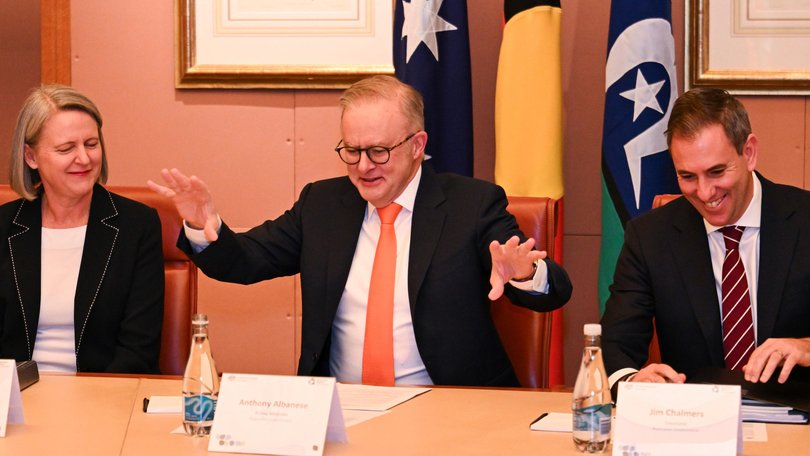
Business has roundly rejected a union push to impose a new tax aimed at training workers, as the opening day of Jim Chalmers’ economic roundtable was diverted by an argument between the two sides of the labour system.
The dynamic emerged as Anthony Albanese said he wanted to see a “contest of ideas” throughout the three-day talk fest in the Cabinet room.
“These three days are going to be really important. It’s about recognising challenges, but more importantly, it’s about grasping opportunity,” he said.
Sign up to The Nightly's newsletters.
Get the first look at the digital newspaper, curated daily stories and breaking headlines delivered to your inbox.
By continuing you agree to our Terms and Privacy Policy.After playing down the likely outcomes of the roundtable, the Prime Minister told participants that some of the ideas they came up with could go to Cabinet “in coming days, literally” for a quick decision.
The skills levy won’t be one of them after Tuesday’s stoush.
Australian Council of Trade Unions representatives repeatedly pushed the idea of a skills levy that would force larger businesses to cover work-related training for their own employees or pay 1.5 per cent of their payroll into a national training fund.
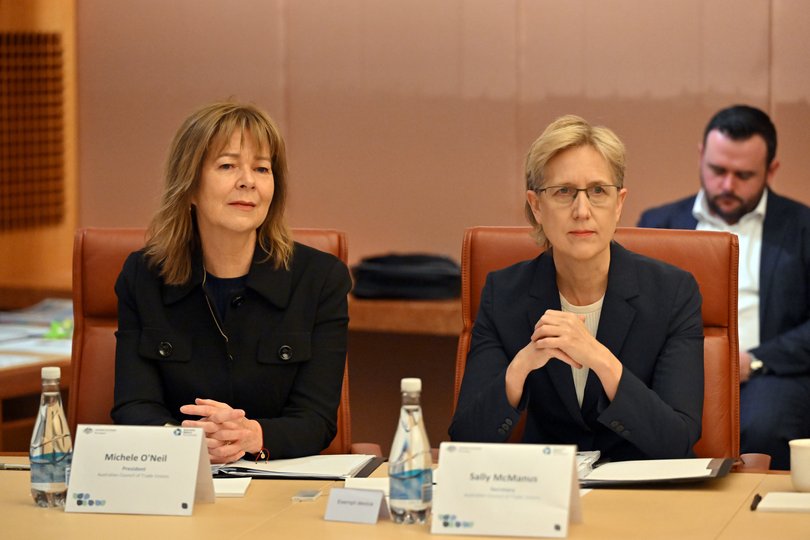
All the business groups represented in the room rejected the idea, multiple sources said.
Dr Chalmers didn’t include the suggestion in his summing up of the session either – giving business some comfort the Government won’t pursue the plan.
“We stressed the importance, instead of using the stick of a levy, of trying to incentivise employers with a carrot,” Business Council of Australia chief executive Bran Black said.
“From a business perspective, we just don’t see that taxing the business community is the right way to deliver the outcomes that Australia needs.”
Australian Industry Group head Innes Willox told media the idea was a “crock of shit” and had been tried unsuccessfully in the 1990s.
Chamber of Commerce and Industry WA chief economist Aaron Morey, who wasn’t in the meeting, said, “There’s not much point in training if there’s not going to be a job at the end of it because investment has been chased overseas.”
Business groups also pointed to existing apprentice incentives, estimating apprentice numbers would halve if those were withdrawn.
However, there was agreement reached over the need to dump more than 300 “nuisance tariffs”, which cost about $150 million to impose but only add $15 million to government coffers.
“Why have something in place that’s not either benefiting the industry or costing us money?” said National Farmers Federation president David Jochinke, who was invited into the room for the international outlook and trade session.
He cited the luxury car tax as an example of a “hangover” from decades past, saying there was no longer an Australian car industry to protect.
A level of consensus was also reached about better recognising and utilising the skills of people already in Australia, rather than changing up the skilled migration system yet again.
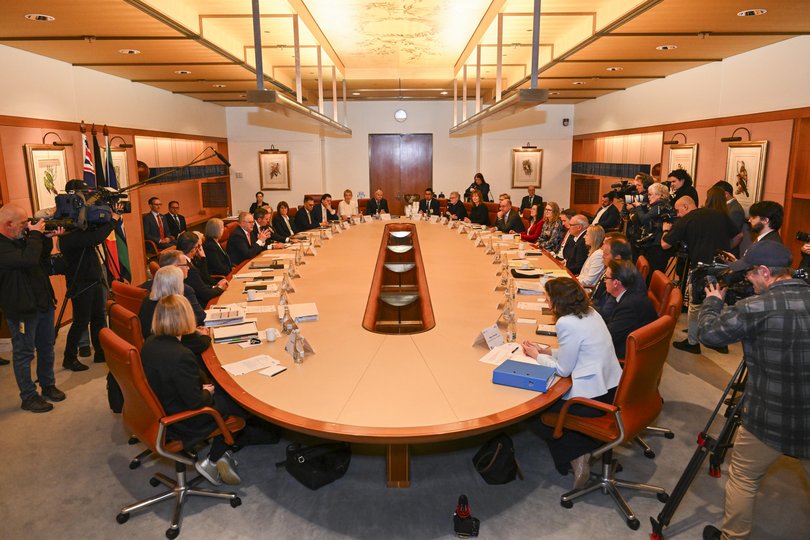
The discussions on Tuesday also covered how to increase capital and business investment.
The sense from some participants was the day one agenda was a way of easing towards the more controversial topics of deregulation, AI and tax reforms that will be covered later.
Although some said many of the exchanges had entailed business and unions each putting their opposing views, another person in the room said some of the most frequent contributions came from neither camp.
Dr Chalmers said people had risen to the occasion and he was thrilled with the “quality and calibre of engagement” on Tuesday.
“Whether it’s skills matching or simplifying trade, capital attraction or technological change, there’s a lot of consensus building in the room already,” he said.
Mr Black said while “there were no surprises” in the policy ideas put forward, it was useful to find consensus “that particular points need to be advanced with greater speed”.
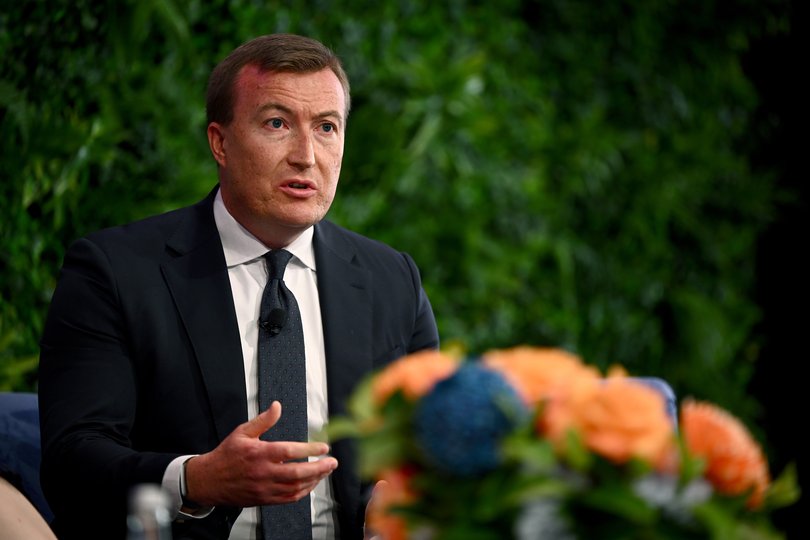
Mr Jochinke agreed, saying, “A lot of this stuff probably isn’t necessarily new, but it’s probably reaffirming the priorities and how to actually get on with solving it.”
Participants weren’t allowed to take phones into the discussion in line with a longstanding rule for Cabinet room security (although a ringing mobile interrupted Dr Chalmers’ opening address).
Instead, each had binders containing printouts, with at least one person asking their staff for a bigger binder midway through the morning to cope with the volume of material.
The conversation was described as fast-moving, covering a lot of ground quickly and frequently pitting union points against business.
Those in the room for only one session were keen not to throw away their shot and raised broad ideas beyond the topic at hand.
Dr Chalmers called for concrete ideas and a willingness from proponents to test them with others present.
“We have filled this room with experience and expertise. We have opened that door to you and opened our minds to your ideas,” he said.
The Prime Minister will host the roundtable participants at the Lodge on Wednesday night for what he stressed would be an informal gathering — “hopefully by then you’re even friendlier” — prompting a joke from Dr Chalmers that for Queenslanders, that meant thongs even in frosty Canberra.
There were plenty of opportunities to get to know each other, with the seating arrangements around the Cabinet table mixing up government, business, and expert representatives, although the ACTU leadership team were seated together.
The talks will turn to red tape and approvals processes on Wednesday.
This is expected to canvass ideas around cutting or freezing red tape for housing, including planning rules and a possible pause on the construction code after next year’s update with exemptions for dealing with urgent defects.
Mr Albanese insisted at the opening that his government was focused on delivery and housing was a big part of that.
“(If) you don’t have a target, you’re not going to be trying to get there,” he said of its 1.2 million homes goal that Treasury and stakeholders have repeatedly warned won’t be met before the mid-2029 deadline at the current rate of building.
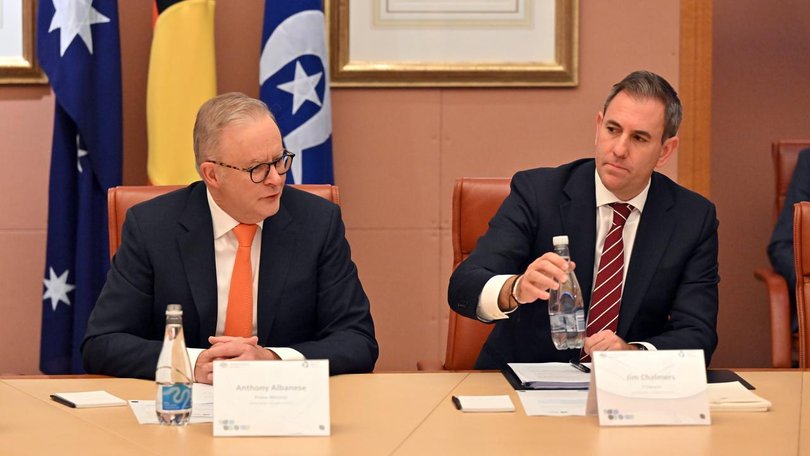
“We think we can get there, and we can get there by making sure that we remove some of the impediments which are there . . . Those impediments aren’t just planning, of course, they’re skills, they’re labour impediments as well.”
Lengthy times — often running to years — for environmental approvals, including on resources and renewable energy projects, have been repeatedly raised during discussions ahead of the roundtable and there is a large appetite to work on a speedy pathway to overhauling the rules.
NSW Treasurer Daniel Mookhey, representing the States, said there was plenty of room to eliminate duplication between levels of government.
“The States do need the Commonwealth to recognise a lot of the work we already do, particularly when it comes to environmental law, particularly when it comes to some of the other features of our planning,” he said.
“What we want is a simple system that recognises . . . that once you’ve gone through a State system, then that should count for something when it comes to the Federal system.”

